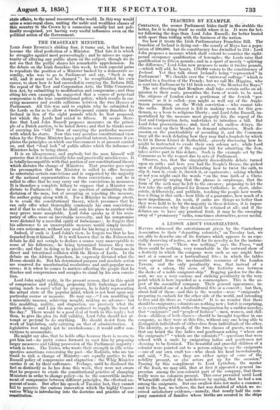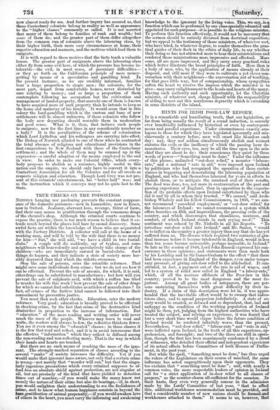A LESSON ABOUT COLONIZATION.
Hsvrxo witnessed the entertainment given by the Canterbury Association to their "departing colonists," on Tuesday last, we are able to describe one of its features which appears to us espe- cially deserving of notice, as well for its novelty as for the instruc- tion it conveys. "There was nothing," says the Times, "and there could be nothing, very remarkable in the outward show of a festivity in which the company were such as one might have met at a concert or a horticultural fête ; in which the tables
were spread from the inexhaustible resources of the London Tavern, and the only peculiarity was, that instead of a tent, or a saloon, the scene of the festivity was between the decks of a noble emigrant-ship." Begging pardon for the dis- sent, we see a very curious and striking peculiarity in the very point which is here regarded as a commonplace. This is the as- pect of the assembled company. Their general appearance, in- deed, reminded one of a horticultural fete or a concert ; but then, about half of them—and this is the wonder—were " emigrants " preparing to embark for the other side of the world, and intending to live and die there as "colonists." It is no wonder that there should be emigrants ; colonists are nothing new ; but it is surprising, as is everything which strikes the imagination by a sudden novelty, that "emigrants" and "people of fashion"—men, women, and chil- dren—children of both classes—should be brought together in one company, as they were at this fête, without any one being able to distinguish individuals of either class from individuals of the other. The identity, so to speak, of the two classes of guests, was such that one heard the fine ladies and gentlemen asking "where are the emigrants?" "which are the colonists? "—questions that were echoed with a smile by emigrating ladies and gentlemen not choosing to be lionized. The beautiful and graceful children of a colonist were pointed out to a person asking to see the emigrants —one of our own craft too —who shook his head incredulously, and said, "No, no ; they are either sprigs of some of the nobility present, or else actors got up for the occasion:" Passing by this compliment to Lord Lyttelton, the master of the feast, we may add, that at first it appeared a general im- pression among the non-colonist part of the company, that there really were no colonists present. This error prevailed until Lord Wharncliffe startled the unbelievers by saying, that he had a son among the emigrants. But one swallow does not make a summer; and to the last, we believe, the fact was doubted of which we re- ceived satisfactory evidence,—namely, that nearly half the com- pany consisted of families whose berths are secured in the ships
now almost ready-for sea. -And further inqtrry has assured us, that these Canterbury colonists belong in reality as well as appearance to the "higher classes" commonly so called. It is not asserted that many of them belong to families of rank and wealth; but some of them do ; and the greater part of them differ altogether from the common ran of colonists above the labouring class, by their higher birth, their more easy circumstances at home, their superior education and manners, and the motives which lead them to emigrate.
It is with regard to these motives that the facts teach a valuable lesson. The greater part of emigrants above the labouring-class either fly from some evil here, of which the pressure has become in- tolerable—the evil, in most eases, of pecuniary difficulties— or they go forth on the Californian principle of mere money- getting by means of a speculative and gambling kind. In the present instance, as we are credibly informed, families bear a large proportion to single men ; the colonists, for the most part, depart from comfortable homes, never disturbed by care relating to money ; and so large a proportion of them contemplate following no occupation but the cultivation and management of landed property, that scarcely one of them is known to have acquired more of such property than he intends to keep as the home and mainstay of his family. It would seem that in this colony the land-gambling which is the custom and bane of new settlements will be almost unknown, if those colonists who follow the body now departing should resemble them in moderation and good sense. What is it, then; that induces such people to emigrate, now for the first time in any considerable number -as a body ? It is the peculiarities of the scheme of colonization which Lord Lyttelton and his colleagues are carrying into effect. The Bishop of Norwich alluded to one of' these when he contrasted the total absence of religions and educational provisions in the first emigrations to New Zealand with those of the Canterbury settlement ; and the whole of them may be summed up in the expression—a careful adoption of the means employed to the end in -view. In order to make our Colonial Office, which every- body proposes to abolish as a nuisance, highly useful to this nationand the empire, we should only have to convert it into a Canterbury Association for all the Colonies and for all creeds as respects religion and education. Though Lord. Grey was not pre- sent at this colonists' entertainment, his "better half" was ; and so the instruction which it conveys may not be quite lost to the State.



























 Previous page
Previous page